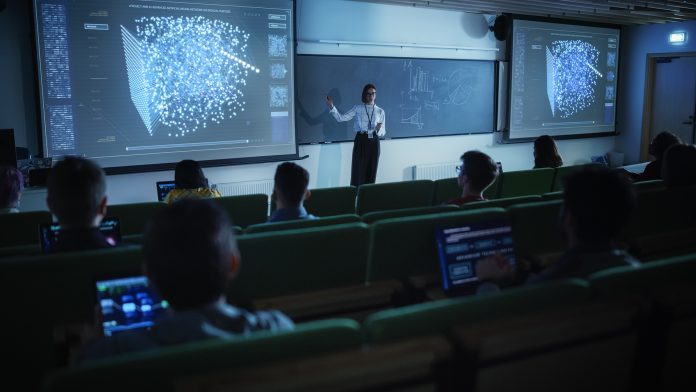Alain Goudey, Associate Dean for Digital at NEOMA Business School, explores how AI skills are being utilised in higher education.
In the rapidly evolving business landscape, generative Artificial Intelligence (AI) has emerged quickly since the end of November 2022, calling on higher education institutions to master critical skills within this area.
Indeed, the advent of AI is seen by many experts as being as impactful as the arrival of the internet in the business world: changes are expected to be massive, fast-paced, and highly impactful for many jobs in every area and sector.
Why is the demand for AI skills rising?
Worldwide, as industries pivot towards a more data-driven approach, the demand for AI skills has dramatically skyrocketed during the last year. As a result, many business schools and universities have had to expand their offerings in order to keep up with this pace of change and cater for a new generation of students who require these skills.
Consequently, new business school programmes have been introduced across the board in order to teach these technological skills, and there has been a sharp increase in digitally focused courses within the higher education sector in recent years. Undeniably, incorporating AI skills into business school programmes ensures students are prepared for professional life where they will have to make decisions or lead projects which include AI.
In addition to this, many schools have also started to use AI skills to enhance the learning experience within their communities for both their students and their faculty, using AI as a digital mentor. For example, students can now be given individual online activities, exercises and assignments to complete online, which can then be monitored by an AI system.
This then collects data about both the individual and the class as a whole and adapts the content to fit the student’s level. Students can then ask the platform for help if they are struggling to get to the answer. Using AI in this way is incredibly beneficial for students as they can have a clear and accurate depiction of where they need to focus their learning.
For example, NEOMA Business School recognised the potential of AI in education, diving into AI-powered adaptive learning in 2021 with the use of AI to sort student profiles into those who were slower or faster learners.
In response, the technology was able to adapt the type and the quantity of exercises available for the students. Professors can also adapt their teaching in order to make fast learners more active (as mentors) and contributors to the course. They can also focus on the more challenging parts of the course for students. The results in terms of learning experience are very positive, and we see this style of teaching as something that will grow in prominence within the higher education sector in the next few years.
Both students and professors need to be taught these skills
Of course, in order for AI to become a seamless part of the higher education community, faculty, as well as students, must be given sufficient ongoing training on the topic.
This can be achieved in a number of ways, such as providing workshops and additional training programmes. In fact, at NEOMA, we have recently introduced mandatory training sessions on generative AI, and have also created an open course online for our entire community. We believe it is vital that entire business school communities are informed and well-trained with generative AI as it continues to infiltrate across sectors.

However, the road to AI integration isn’t without its challenges. Ethical considerations, potential misuse, and the ‘GPT-isation’ of evaluations are pertinent issues to take into account. ChatGPT is an AI programme owned by OpenAI that has gained significant publicity over the past few months. Actually, it’s a controversial topic in higher education, with several universities and business schools banning the use of AI skills and tools due to concerns about plagiarism.
But AI cannot be ignored, and instead, schools must address these concerns, and measures must be put in place to address ethical apprehensions and prevent misuse, fostering a culture of integrity and excellence.
This has been done at NEOMA, and during the summer, faculty assessed the risk of ‘GPT-isation’ of the assignments and redesigned them if needed. We have also updated our regulation documents to integrate the use of generative AI and how to cite it in academic work. The careful integration of AI is key, and if done correctly, schools will be able to use AI to enhance their offerings and see it as a positive step forward for their teaching methods.
In the era of Artificial Intelligence, AI skills should be harnessed to augment, not replace, human intelligence. At NEOMA, we encourage the utilisation of AI tools for assignments, fostering a conducive environment for practical learning, while also preparing them for the intricacies of the digital professional world. Students have to learn how to use it for good, in a smart way, to achieve higher quality work.
AI is going to be integrated into every technological tool we use every day, and therefore higher education institutions should be training not only their students, but their entire communities, to master this kind of technology.









